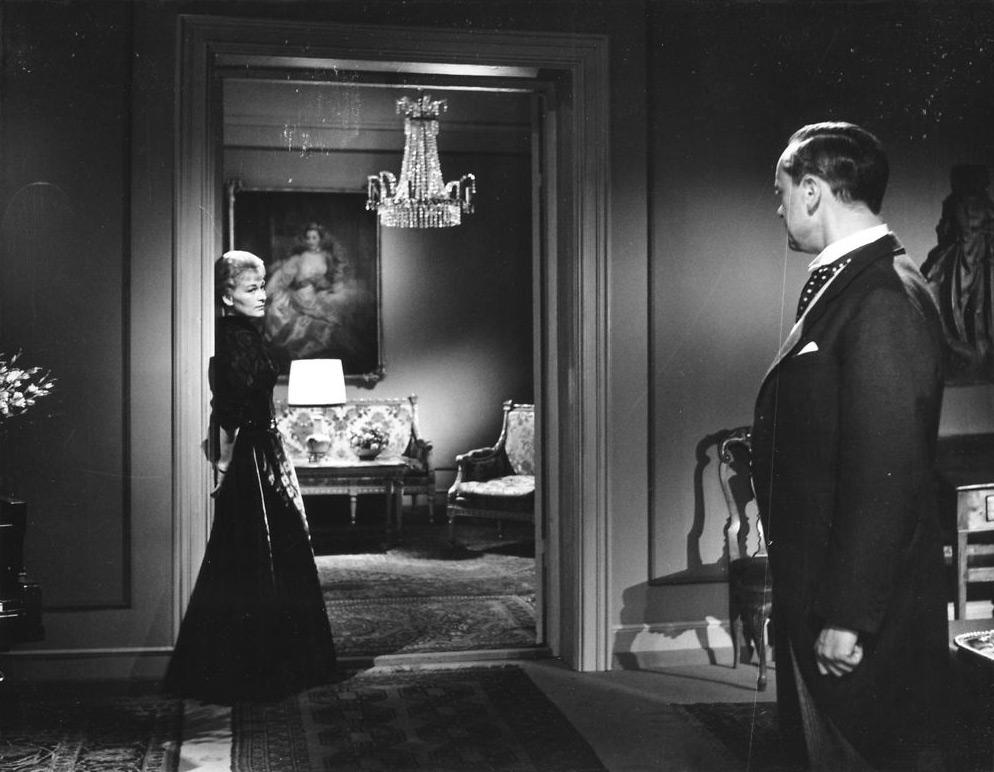(Carl Th. Dreyer, DK, 1964)
Gertrud is in a passionless marriage to Gustav Kanning. She tells him she wants a divorce, that she has begun a relationship with a young artist, Erland Jansson. Jansson seems ready to give up everything for his love for Gertrud, but still he falls short. At a party she meets an old love, Gabriel Lidman, who never got over that she left him. Gertrud will only be in a relationship if both parties make love their top priority. She won’t tolerate that the man in her life equates his love for her with his love for his work – or for his Havana cigars. Thirty years later she is all alone, looking back on her uncompromising life, regretting nothing. For Gertrud there is only love.
Gertrud, based on a 1906 play by Hjalmar Söderberg, was Dreyer’s last film. The spirit of Söderberg’s play is naturalistic, while Dreyer’s film is exquisitely stylised, seeking tragedy. In a rare move for Dreyer, there are almost no close-ups. Instead, we are treated to long, elaborate camera movements in a film that consists of just 89 setups. The end result is an almost relentlessly stripped-down visual style, characterised overall by purity and simplicity. There is consistently distance, both visual and emotional, between the characters and, in turn, no eye contact, while the lines are spoken very much like lines. This is the ultimate of Dreyer’s many portraits of women. While Dreyer’s other female characters typically are suffering women or victims of power and men, Gertrud is a strong, free woman who chooses life without tepid men and half love.
Gertrud had its world premiere in December 1964 in Paris, and both the Danish and the French reviews of the event were virulently negative. The film was criticised mainly for its stiff acting style and slow tempo. When the film premiered in Denmark two weeks later, the critical reception was more muted. Subsequent discussion in the papers especially held up Dreyer’s portrait of a woman as significant and relevant.
Gertrud is still a film that divides audiences. It is remarkable that Dreyer, who always followed the beat of his own drummer without regard for the times or prevailing fashions, still, in this, his last film, stylistically and thematically, superbly inserts himself among the modern European films of his day.
DAN NISSEN
Credits / Gertrud
| Production company |
Palladium |
| Distributor |
Film-Centralen-Palladium |
| Censorship classification |
No restrictions |
| Release date and place |
1.1.1965 / Dagmar
First screening at Le Studio Médicis in Paris 18.12.1964 |
| Based on |
A play by Hjalmar Söderberg (1906, in Danish 1967) |
Directed by
| Carl Th. Dreyer |
Director |
| Jens Ravn |
Assistant Director |
| Solveig Ersgaard |
Assistant Director |
Screenplay
| Carl Th. Dreyer |
Screenwriter |
| Grethe Risbjerg Thomsen |
Poems |
Produced by
| Niels Jørgen Nielsen |
Producer |
| John Hilbard |
Production Manager |
| Erik Overbye |
Production Manager |
Cinematography by
| Henning Bendtsen |
Director of Photography |
| Arne Abrahamsen |
Camera Operator |
| Else Kjær |
Stills |
Lighting by
Editing by
Music by
| Jørgen Jersild |
Composer |
| Gurli Plesner |
Singing |
| Peter Willemoes |
Recording |
Production Design
| Kai Rasch |
Art Direction |
| Willy Berg Hansen |
Set Assistant |
Costumes
| Berit Nykjær |
Costume Designer |
| M.G. Rasmussen |
Men's costumes |
| Fabielle |
Gertrud's costumes |
Cast
| Nina Pens Rode |
Gertrud |
| Bendt Rothe |
Gustav Kanning |
| Ebbe Rode |
Gabriel Lidman |
| Baard Owe |
Erland Jansson |
| Axel Strøbye |
Axel Nygren |
| Vera Gebuhr |
Kanning's maid |
| Lars Knutzon |
Student |
| Anna Malberg |
|
| Edouard Mielche |
|
| Karl Gustav Ahlefeldt |
|
| William Knoblauch |
|
| Valsø Holm |
|
| Carl Johan Hviid |
|
